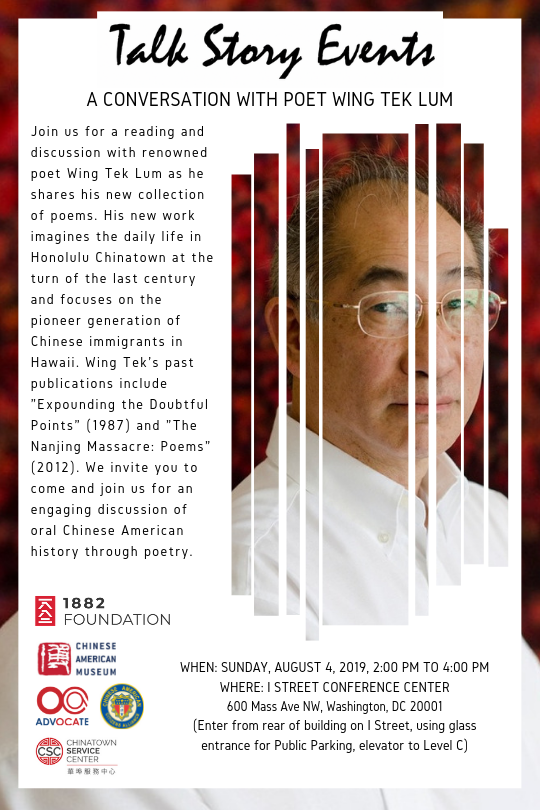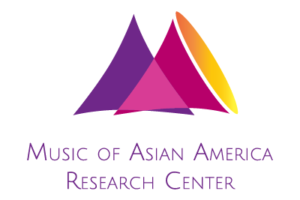On August 4, the 1882 Foundation had the honor to host renowned poet Wing Tek Lum for Talk Story. Wing Tek’s past publications include Expounding the Doubtful Points (1987) and The Nanjing Massacre: Poems (2013). That same weekend, Wing Tek was in Washington, D.C. for the Smithsonian Asian American Literature Festival, where he participated on Friday and Saturday. On Sunday afternoon, Wing Tek paid the 1882 Foundation a visit to Chinatown to share his unpublished poems and working drafts of his new collection at Talk Story, which revolves around the stories of pioneer Chinese immigrants in Hawaii.
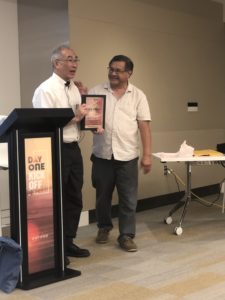
When we first got in contact with Wing Tek for Talk Story, he expressed his desire to share his new collection specifically with the people of DC Chinatown, because he knew that his poems would resonate with this specific audience.
Wing Tek’s journey as a poet is unorthodox but inspiring. At Brown University, he majored in engineering, and edited the school’s literary magazine. While he had to fill up his classes with STEM courses, he jumped at the chance to take two poetry classes at college, which became the extent of his formal poetry training. Wing Tek’s poetry explores the Chinese American identity, never forgetting the trials and tribulations that come with it. By telling these stories, he recalls his own history, as well as other Chinese Americans’ histories, and celebrates it. When we first got in contact with Wing Tek for Talk Story, he expressed his desire to share his new collection specifically with the people of DC Chinatown because he knew that his poems would resonate with this specific audience. He was looking for people who would understand his poems more deeply, and Talk Story was the perfect place to do it.
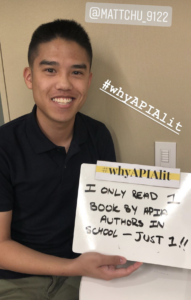
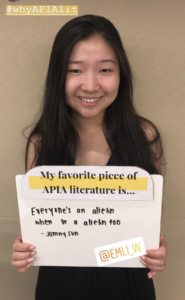
In accordance with the Asian American Literature Festival that same weekend and 1882’s participation at the festival’s Literary Lounge, we invited our attendees to answer #WhyAPIALit to encourage people to think about the importance of Asian American literature. It was the perfect chance to get people thinking about Asian American literature, especially for those who weren’t as familiar with it. The answers we received on the white boards we provided were so enlightening and a really great way to introduce the event’s overarching theme of Asian American literature.
One poem that I was particularly intrigued by was called “My Home,” which explored the desire of Chinese immigrants and laborers to return to China to the families and the lives they left. The poem was delicately written, brimming with nostalgia and remembrance. However, it still reminded the audience of how unrealistic it was to fulfill this desire. The immigrants that the poem speaks of could not go back to their hometowns and old lives. And because they can’t, all they have are their memories.
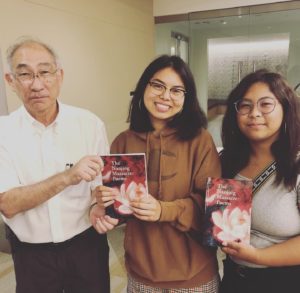
Hearing Wing Tek present his poems to Chinatown residents and other Chinese Americans reminded me why it is important to uplift histories, like the ones Wing Tek tells in his poems, through art. I was unsure how our typical Talk Story attendees would react to his poetry, especially because I know that not everybody particularly enjoys poetry. However, I think Wing Tek accomplished his goal to share his poetry with people who understand the histories that he tells in his writing. The audience was responsive and related to the detailed images Wing Tek included in his lines and marveled after every reading. At some moments throughout the presentation, I watched the audience’s reaction from where I was sitting and it was fascinating to watch people nod or mumble at lines they resonated with. Our Talk Storys aren’t typically as quiet as this one was, but the silence in the room spoke volumes. That day, Wing Tek told everybody’s stories, in one way or another. It bridged generations of Chinese Americans in one room to understand their history and how it has shaped the present.
In the last few minutes of his talk, Wing Tek shared a model quote from the original Talk Story event in Hawaii in June 1978 that the 1882 Foundation Talk Story events are inspired by (and that he actually attended!). It said:
“Words bind and words set free.”
I think that one of the strongest aspects of poetry is that it invites people, despite any degree of similarity or lack thereof, to understand a person’s story beyond just details. It pushes the reader to feel something alongside the writer, and I saw this happen between Wing Tek and his audience at Talk Story. Wing Tek’s interaction with the audience–as brought together by his poetry–was inspiring, transparent, and so moving.

